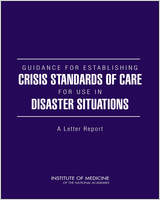Guidance for Establishing Crisis Standards of Care for Use in Disaster Situations

Source: Gostin, L. O., Hanfling, D., Hanson, S. L., Stroud, C., & Altevogt, B. M. (Eds.). (2009). Guidance for establishing crisis standards of care for use in disaster situations: A letter report. National Academies Press.
The influenza pandemic caused by the 2009 H1N1 virus underscores the immediate and critical need to prepare for a public health emergency in which thousands, tens of thousands, or even hundreds of thousands of people suddenly seek and require medical care in communities across the United States.
Guidance for Establishing Crisis Standards of Care for Use in Disaster Situations draws from a broad spectrum of expertise--including state and local public health, emergency medicine and response, primary care, nursing, palliative care, ethics, the law, behavioral health, and risk communication--to offer guidance toward establishing standards of care that should apply to disaster situations, both naturally occurring and man-made, under conditions in which resources are scarce.
This book explores two case studies that illustrate the application of the guidance and principles laid out in the report. One scenario focuses on a gradual-onset pandemic flu. The other scenario focuses on an earthquake and the particular issues that would arise during a no-notice event.
Outlining current concepts and offering guidance, this book will prove an asset to state and local public health officials, health care facilities, and professionals in the development of systematic and comprehensive policies and protocols for standards of care in disasters when resources are scarce. In addition, the extensive operations section of the book provides guidance to clinicians, health care institutions, and state and local public health officials for how crisis standards of care should be implemented in a disaster situation.
- ISSUP members can join Networks to comment – Sign in or become a member